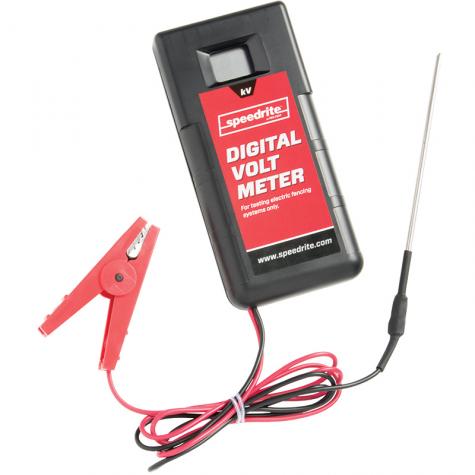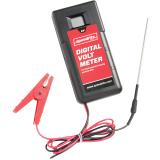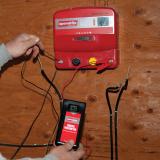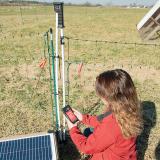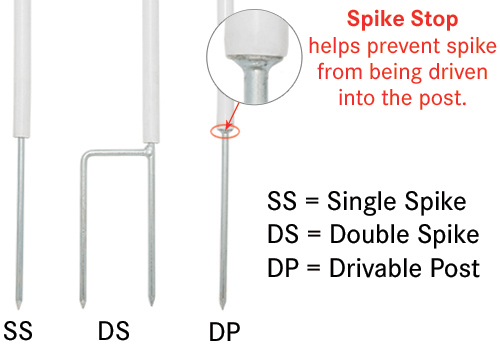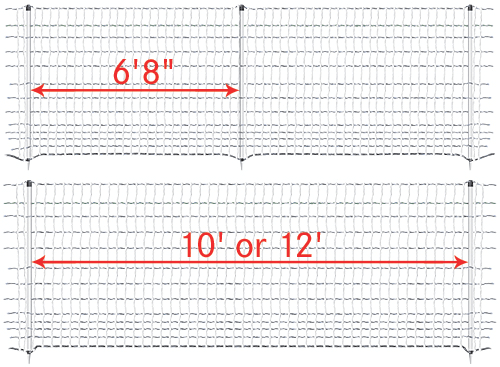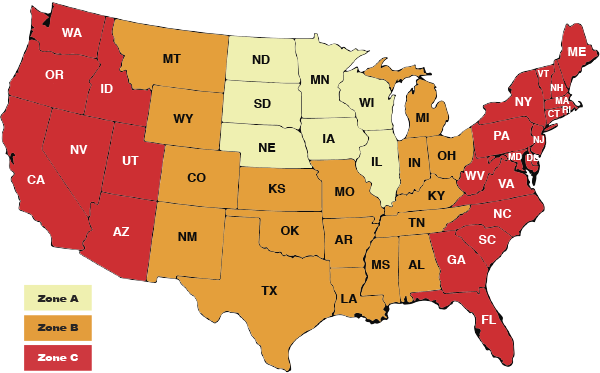Digital Voltmeter
Product Details
An essential tool for those reliant upon their electric fences to keep animals in and predators out. Measures the peak voltage of fence energizers.
- Gives an exact reading of volts on the fence line
- Can test your ground rod and energizer
- Large black numbers are easy to read, even in sunlight
Instructions/Diagrams:
Common Uses
Specs
- 37"L ground cable
- 4.5"L ground probe
- 1" x 0.75" digital display
- Protective case included
- Hard plastic body: 6"L x 3"W x 3/4"D
- 9V battery, included (normally lasts over 1 year)
How to Use
- Insert probe into the ground
- Clip the red fence clip to the live fence wire
- Read the digital readout of volts. It is shown in kV (2.7 kV = 2700V)
- Remove voltmeter clip from fence, then gently remove the probe from the ground (do not pull the wire, only grab the metal probe to remove)
- Turn off energizer
- Disconnect ground wire and fence wire from energizer
- Turn on energizer
- Touch probe from tester to ground terminal on energizer
- At same time touch the red fence clip to fence terminal on energizer
- The tester should light up to 6000V or more
Troubleshooting
- Disconnect the fence from your energizer and test across the two terminals on the energizer. If the readout is higher that what you found when you tested the fence, the fence is the culprit. However, if the voltage readout remains suspicious, the problem may be with the voltmeter. Check the battery (see information below) before "giving up" on the tester.
- The internal battery can also affect the accuracy of the digital reading. If either of the following is observed, change the battery (remove the screw on the back of the voltmeter to do so) and retest your fence.
- The luminosity of the output reading becomes weak.
- Voltage readings drop with each pulse (at the same fence location).
Precautions
When the unit reads "LL" or "low batt," the battery on the tester (not the energizer's battery) is low and needs to be replaced.
Write a Review
You must be logged in to leave a review. Please sign in.
Lynnea H
This voltage meter is a great buy. I recently put up an energized fence to protect a beehive from bears. The fence, itself, will not keep the bear out but the shock will teach it to avoid the area. It is important to know exactly what the voltage is in the fence. The meter is easy to use plus gives voltage numbers. Knowing the numbers makes it easier to trouble shoot the fence.
earl k from pa
Couldn't be any better. The finest I have ever owned.
Avrum E
First off, Premier have always been great with customer service and the quality of the products they sell has been uniformly good. This meter is replacing one that I bought from Premier at least 10 years ago, which had been made in Germany, and is finally starting to fail(readings vary wildly depending on where you hold the case). The new meter appears to produce reliable, repeatable readings, and thus allows for finding elusive shorts, plus it is a bit smaller than the older model. Two things I would have preferred: longer and heavier cables, and an option for attaching a clamp in place of the ground probe. Both of these features were present on my old meter. My fence is permanent electrified wires strung parallel to a chain-link fence, so the latter is a very reliable ground reference, and if I stick the probe in the ground, I can't reach the top electrified wire with the short cables, plus we have very hard, dry soil about 8 months out of the year. I'm also a little concerned that both cables exit the case from the same opening, and if the insulation wears there, they will short to each other - on the old meter they exited from opposing corners, and even when the insulation was so worn that I had to be careful to keep my hand away from there, the meter still functioned
Diane G from Arkansas
Great in comparsion to the other meters on the market. I have most of the meters in the market. But this one is so easy to use. Especially the alligator clamp for the positive wire. Also, you get great, fast service from this company.
Christina F from Caribbean
I've had this voltmeter for three years. It's bulky but I like the style with the ground probe as it lets me test the fence as the animals will experience it - standing on wet grass, on dry grass, on exposed soil... The voltage reading will vary greatly and thus the shock the animal will receive. I rarely push the probe all the way into the soil unless I am testing the energizer by itself or troubleshooting 'dead' zones. Great, reliable tool.


